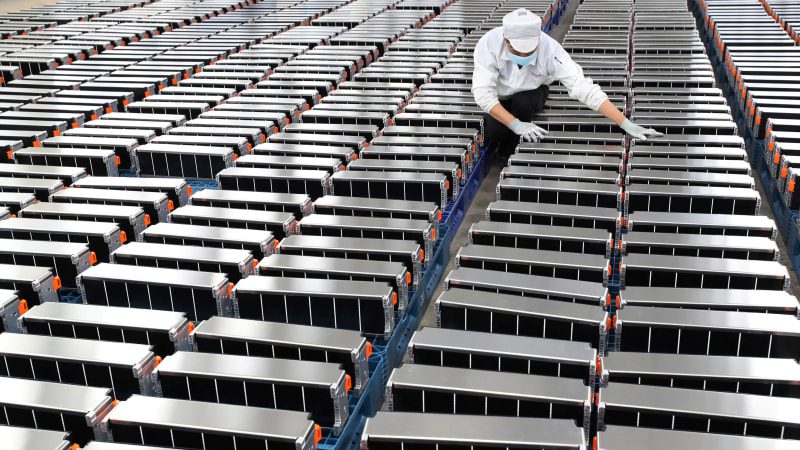If the battery is the key to an EV future, China's got a lock on it

A worker with lithium EV batteries at a factory for Xinwangda Electric Vehicle Battery Co., in Nanjing, China, in 2021. (AFP via Getty Images)
The race to build a better (translation: cheaper) battery for the soon-to-come wave of electric cars has barely begun. But The New York Times has already declared a winner.
In a thoroughly researched article this week in the Times, called “Can the world make an electric car battery without China?,” the reporters conclude that the Chinese have already captured the prize. They are “so far ahead mining rare minerals, training engineers and building huge factories that the rest of the world may take decades to catch up.”
Bold predictions, but reporters Keith Bradshaw and Agnes Chang take pains to back them up, by detailing China’s super ambitious chain of production, from taking raw materials out of the earth to actually building the vehicles that use the lithium ion batteries.
Theirs is a scenario focusing on supply controls — mining ingredients such as cobalt, lithium, nickel, and more — that is likely to allow the Chinese a dominant position in the battery chase. And while Western countries are playing catch-up to source these materials, they have balked at investing “into countries with unstable governments or poor labor practices. And they have been slow to ramp up their own production,” the story goes on to say.
The Chinese, on the other hand, lack such restraints and have relied on state funds to acquire stakes in mining firms on five continents. As a result, the reports states, “China controls 41 percent of the world’s cobalt mining, and the most mining for lithium, which carries a battery’s electric charge.”
The piece goes on to explain the complex processing and refining steps needed to create a usable battery, and says that once again the Chinese have the upper hand there. Today, it says, the United States “has little processing capability. A refinery typically takes two to five years to build. Training workers and adjusting equipment can take additional time.”
For high schoolers looking to cite some relevant source material for their term papers on EVs, the Times story is a font of information, displayed quick-hit style right up front:
Cobalt mining: 41% globally is Chinese owned
Cobalt refining: 73% in China
Cathodes: 77% made in China
Anodes: 92% made in China
Battery cells: 66% assembled in China
Electric cars: 54% built in China
“China has the most electric cars on the road, and nearly all of them use Chinese-made batteries,” the piece says. “In 2015, Beijing enacted policies to block foreign rivals and raise consumer demand. … Electric car buyers in China get tax rebates, cheaper vehicle registration, preferential parking and access to an extensive charging network.”.
Although car manufacturers in other countries spend big on alluring ads hyping an “inevitable” electric vehicle future, the Chinese spend on battery research. The Times story concludes by noting that it’s “next to impossible” for any other country to become self-reliant in the battery supply chain.
Says Scott Kennedy, a senior adviser at the Center for Strategic and International Studies, “There is no way anybody is going to become successful in electric vehicles without having some type of cooperation with China, either directly or indirectly.”
Read the full report here.



